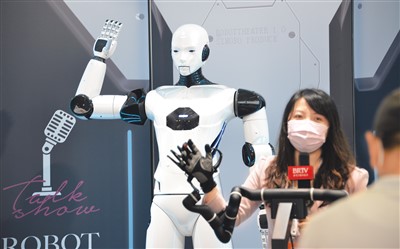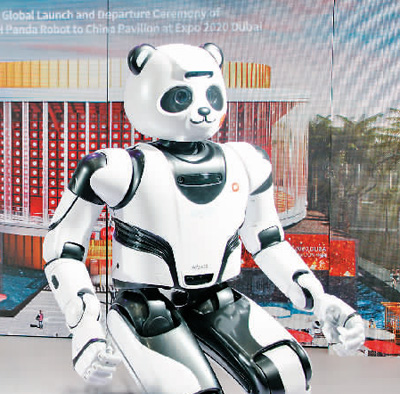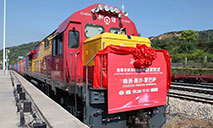China makes great strides in robot industry
Despite being a latecomer, China has seen the vigorous development of its robot industry over the past years.

A service robot dances at the World Robot Expo in Beijing, Sept. 10, 2021. (Xinhua/Ren Chao)
In 2020, the size of China’s robot sector surpassed 100 billion yuan (about $15.48 billion) for the first time, with the country becoming a vital force to support the development of the global robot industry, according to an official from the Ministry of Industry and Information Technology (MIIT).
Xin Guobin, vice-minister of the MIIT made the remarks at the opening ceremony of the 2021 World Robot Conference, held in Beijing from Sept. 10 to 13.
China has remained the world’s largest market for industrial robots for eight consecutive years, and its installed industrial robots accounted for 44 percent of the global total, Xin noted, adding that the output of Chinese industrial robots increased from 72,000 units in 2016 to 212,000 units in 2020, recording an annual growth rate of 31 percent on average.

A reporter interacts with an intelligent robot actor at the World Robot Conference in Beijing, Sept. 12, 2021. (Xinhua/Li Xin)
Meanwhile, Chinese service and special robot manufacturers above the designated size, or those with an annual revenue of more than 20 million yuan each, earned 52.9 billion yuan in revenue last year, a year-on-year increase of 41 percent, Xin said.
However, it’s not easy for China to secure its position in the global robot sector. Qu Daokui, founder of China’s leading robot maker, Siasun Robot and Automation Co., Ltd., was one of the pioneers of the country’s robot industry.
In 1992, Qu was a young researcher at the Shenyang Institute of Automation under the Chinese Academy of Sciences in northeast China’s Liaoning province. When he visited Volkswagen’s plant in Wolfsburg, Germany, he was astonished by a car assembly line featuring hundreds of robots. “Back then, few Chinese labs had robots for research purpose, but robots had been widely applied in foreign countries,” he recalled, indicating that China lagged far behind Germany in terms of the robot industry at that time.
Eight years later, Qu led a team of several researchers and established Siasun. From the very beginning, the company was determined to become a pioneer, not a follower, by leveraging its research and development capabilities and technological advantages.
Over the past 20-plus years, Siasun has grown into one of the top ten robot manufacturers in the world, with the most comprehensive robotic product line. The company’s robots have been exported to over 40 countries and regions.

A robotic bull performs at the World Robot Conference in Beijing in 2021. (Xinhua/Li Xin)
Similarly, Li Zexiang, another academic entrepreneur in China’s robot sector, established the Automation Technology Center at the Hong Kong University of Science and Technology in 1992 after completing his studies overseas. He founded Googol Technology (HK) Limited in Shenzhou, south China’s Guangdong, in 1999, for the research and development of motion controllers for the manufacturing sector. Now, Googol Technology has provided over one million motion control systems for companies in nearly 60 industries, including new energy, in over 30 countries and regions.
The rapid development of the two companies epitomizes the rise of China’s robot industry, which has gone from zero to one and from nothing to something. Apart from the efforts of pioneers like Qu and Li, tech talents and comprehensive industrial and supply chains are the other driving forces behind China’s booming robot industry, according to industry insiders.

Photo shows a panda robot at the World Robot Conference in Beijing in 2021. (Xinhua/Li Xin)
Despite the achievements, the development of the country’s robot sector is still in its infancy, Xin Guobin said, calling for making breakthroughs in core technologies and increasing the supply of high-end robots.
Talents hold the key to the further development of China’s robot industry. To Li Zexiang, turning academic teams into entrepreneurs is the most direct way for cultivating talents in the sector. For this purpose, Li set up the Songshan Lake Xbot Park in Guangdong’s Dongguan city, which has incubated 60 enterprises that specialize in robotics and smart hardware.
Photos
Related Stories
- Greece's Hellenic Post employs Chinese-made mail sorting robots
- China’s booming robot industry displays a wider range of innovations and applications
- Chinese-made orthopedic surgical robots complete over 400 surgeries
- 2021 World Robot Conference held in Beijing
- The World Robot Conference 2021 kicks off in Beijing
- Digital technologies boost rural economy in E China’s Deqing county
Copyright © 2021 People's Daily Online. All Rights Reserved.










